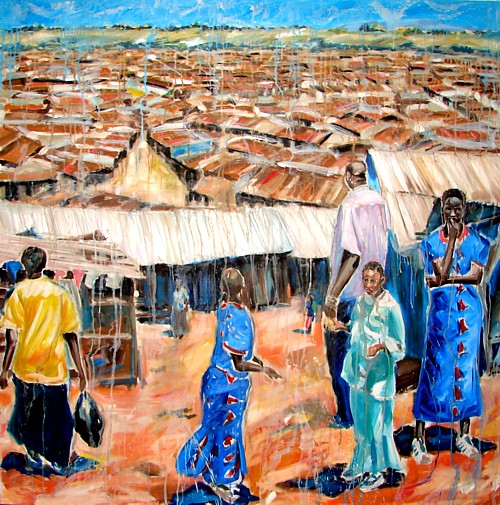 |
 |
 |
 |
 |
 |
|
 |
 |
 |
 |
 |
 |
 |
Régions du Québec |  |
 |
 |
|
 |
 |
|
 |
 |
|
 |
 |
'Making Cents: Life Below the Bottom Rung'


A new series of oil paintings examining the daily existence of people making a living in the worst working conditions in the global economy.
'Nations are not communities and never have been. The history of any country, presented as the history of a family, conceals fierce conflicts of interest (sometimes exploding, most often repressed) between conquerors and conquered, masters and slaves, capitalists and workers, dominators and dominated in race and sex. And in such a world of conflict, a world of victims and executioners, it is the job of thinking people, as Albert Camus suggested, not to be on the side of the executioners.'
Howard Zinn 'A People's History of the United States'
While reading the International Herald Tribune I came across an article entitled 'Deal near for global pact on ship recycling' (15 May 2009). The article notes that '[t]he dismantling of ships, so that their steel and other materials can be sold as scrap, is often done on or near beaches in poor countries, notably India and Bangladesh. Both nations have pledged to improve working conditions and environmental practices. But labor advocates contend that the process still kills and maims many workers each year and results in the contamination of shorelines with asbestos, oily waste, toxic paint and other dangerous materials.' It struck me that it is rare to see images of people in such working conditions depicted in paintings.
Following Sartre's dictum that 'to reveal is to change' I decided to make a painting that would in a sense 'reveal' this type of work to those like myself who had never come across it before. Like many bad situations they continue without change for a long time because of a lack of awareness of their existence by many who often benefit directly or indirectly from them. I looked at other situations where people worked in very bad and sometimes even horrific working conditions (such as recycling in dumps where children have been buried in the process). I talked about this to friends who told me of other situations (such as sulphur workers in Indonesia who carry 70 - 100Kg's on their backs for 2-3hrs to make $1 causing at the same time burnt skin and lungs).
The globalisation of the world economy has allowed for extremes of exploitation of workers in poor countries. This exploitation is 'hidden' behind advertising and aesthetically designed products. Looking at the people behind the products reminds us that our lifestyle has its negative side too.
A excellent book on this subject is Planet of Slums by Mike Davis published by Verso (2006).
| Attachment | Size |
|---|---|
| kibera500web.jpg | 0 bytes |
 |
 |
 |
 |
G20 Special |  |
 |
 |
|
 |
 |
|
 |
We offer many independent reports and testimonies...

List of actions held during this "counter-summit" in Toronto You may also want to visit these alternative media in Toronto: G20 Alternative Media Centre http://2010.mediacoop.ca Media Co-op Toronto http://toronto.mediacoop.ca Toronto Community Mobilization www.attacktheroots.net |
 |
 |
 |
 |
 |
 |
 |
CMAQ: Vie associative |  |
 |
 |
|
 |
 |
|
 |
 Quebec City collective: no longer exist. Get involved ! |
 |
 |
 |
 |
 |
 |
 |
 |
|
 |
 |
 |
Ceci est un média alternatif de publication ouverte. Le collectif CMAQ, qui gère la validation des contributions sur le Indymedia-Québec, n'endosse aucunement les propos et ne juge pas de la véracité des informations. Ce sont les commentaires des Internautes, comme vous, qui servent à évaluer la qualité de l'information. Nous avons néanmoins une
Politique éditoriale
, qui essentiellement demande que les contributions portent sur une question d'émancipation et ne proviennent pas de médias commerciaux.
This is an alternative media using open publishing. The CMAQ collective, who validates the posts submitted on the Indymedia-Quebec, does not endorse in any way the opinions and statements and does not judge if the information is correct or true. The quality of the information is evaluated by the comments from Internet surfers, like yourself. We nonetheless have an
Editorial Policy
, which essentially requires that posts be related to questions of emancipation and does not come from a commercial media.


